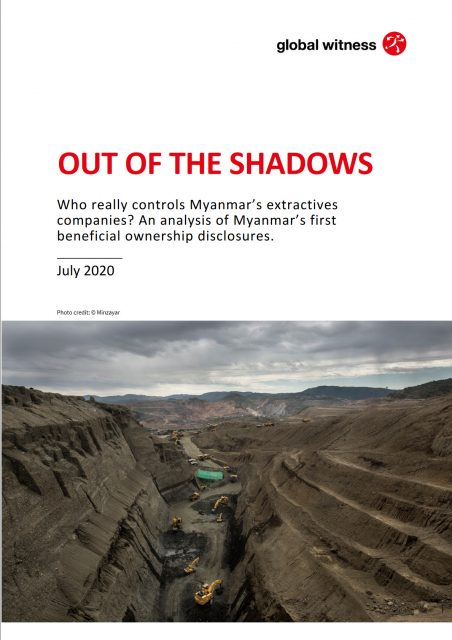Out of the Shadows: Who Really Controls Myanmar’s Extractives Companies?
23 July 2020


Myanmar’s first ever disclosure of beneficial ownership information is an important step forward for the troubled oil, gas and mining sector, but major problems with the data must be addressed, our new analysis shows.
On 27 December 2019, Myanmar’s government took an important step towards making the country’s troubled extractives sector more accountable. The Directorate of Investment and Company Administration (DICA) began publishing information on the beneficial ownership of extractives sector corporations registered in Myanmar. Global Witness, along with other civil society organisations, has long called for greater transparency about who ultimately owns and controls oil, gas and mining companies in Myanmar. In passing this milestone, Myanmar joined a small group of countries that have heeded these calls.
Beneficial ownership, as defined by Open Ownership, the organization that created the Beneficial Ownership Data Standard (BODS) to help standardize data collection globally, is the “right to some share of a legal entity’s income or assets (ownership) or the right to direct or influence the entity’s activities (control).” This information is key in the fight against corruption, tax evasion and conflicts of interest. Public information on who controls companies helps people to understand who they are doing business with, and helps civil society to hold the powerful to account. Public scrutiny can also act as an important mechanism discouraging companies from publishing poor quality data given the risks of reputational harm for filing inaccurate disclosures.
Beneficial ownership data is particularly valuable in Myanmar, as the economy has long been dominated by a network of companies connected to the current military, members of the former military junta, ethnic armed groups, government-backed militias and well-connected cronies. The flow of profits in these corporate networks often can be obscured by the use of nominees standing in for the politically connected owners who want to keep their names off official documents. These nominees can often be family members but can also be friends and associates. Beneficial ownership disclosure requirements can cut through some of this fog and have the potential to give the people of Myanmar their first look at who really owns their nation’s companies. While some companies may try to hide their true ownership by filing misleading or false information, and others may simply do so in error, such data can still provide valuable clues as to who a company’s real owners are.
Beneficial ownership information can also help to expose the business interests of those involved in the conflicts that plague Myanmar’s periphery. The plight of the Rohingya Muslims, and the military’s role in the widely reported atrocities in Rakhine State, along with abuses committed against ethnic communities in Kachin, Northern Shan, Karen and other ethnic communities has demonstrated the need for a better understanding of those companies connected to the military, in order to hold the military to account more effectively for their actions.
Similarly, companies with opaque ownership have long played a major role in the jade mines of Kachin State, where jade profits help drive the ongoing conflict. As Global Witness has previously documented, the lucrative jade sector is dominated by military-linked entities, cronies, ethnic armed groups and government-backed militias, who largely evade oversight. They reap huge profits from an industry whose production in the peak year of 2014 was estimated by Global Witness to be worth over $30 billion a year. Even outside this peak year, the sums remain staggering: a 2019 analysis by the Natural Resource Governance Institute estimated the value of jade mined and sold outside this peak year at between $2-15 billion annually.
While cronies, armed groups, and hidden business interests have enriched themselves, local people in mining areas like Hpakant remain poor. They face the devastating environmental and social consequences of rampant and unregulated extraction, while caught between the armed groups controlling the mining areas. The reality of these consequences was once again laid bare on 2 July when a landslide in Hpakant buried nearly 200 artisanal miners alive while they hunted for jade in a mining site that Myanmar’s government had ordered to close for the monsoon season. Without knowing the true owners of the companies profiting from Hpakant’s lawlessness, it is impossible to fully address the ongoing problems of conflict and governance in Kachin State.
If Myanmar’s public beneficial ownership register is to deliver on its promise, however, companies will need to file accurate information. Our analysis reveals that, for a variety of reasons, over one-third of the companies required to submit beneficial ownership information in the first round, filed inadequate or inaccurate disclosures, did not submit any filing at all, or filed late.
DICA will be a key player in helping to remedy some of these problems given its role in collecting this information from companies. The Beneficial Ownership Task Force will also play a vital role in bringing together government representatives, business leaders and members of civil society to establish an effective policy framework and define essential reporting requirements.
Other stakeholders have roles to play as well. The Ministry of Natural Resources and Environmental Conservation, the Ministry of Energy and Electricity, and the licensing bodies each of these ministries oversee – the Myanmar Gems Enterprise, the Department of Mines and the Myanma Oil and Gas Enterprise (MOGE) – serve an essential function in regulating, incentivizing and enforcing compliance. The Anti-Corruption Commission can investigate entities suspected of corruption, the Attorney General’s Office can ensure an integrated legal framework, and the Hluttaw (legislative assembly) can provide the necessary legal framework.
Key findings
- A significant number of companies did not file at all or filed late. Of the 162 companies included in the first batch of disclosures, 24 (15%) completely failed to submit disclosures and 17 more (10%) submitted their filings late. In the future Myanmar’s government, in partnership with champions in the business community, must take measures to ensure compliance, such as withholding operating licences from non-compliant companies, suspending or revoking their licences, or imposing financial penalties such as large fines.
- Many filings contained incomplete beneficial ownership information. Three companies failed to list qualifying legal owners as beneficial owners. Five listed corporate owners without providing information on who their beneficial owners were. Three additional companies owned by foreign state-owned enterprises filed inadequate information. In all, 11 of the 162 companies (7%) submitted filings that were incomplete.
- Data on politically exposed persons (PEPs) is poor. The Myanmar Extractive Industries Transparency Initiative’s (MEITI) Beneficial Ownership Task Force defines PEPs as, “individuals who are or were entrusted with prominent public functions, either domestically or internationally.” Due to their influence and positions, PEPs pose a higher risk of corruption as they can abuse their positions to hide financial flows or curry political favour. Transparency about their roles is therefore vital. Only eight companies (5%) declared that one or more of their beneficial owners should be considered a PEP as per the MEITI Beneficial Ownership Task Force definition.
- The prevalence of politically connected business tycoons in Myanmar’s economy, and particularly in its extractive sectors, makes the existence of so few PEPs highly unlikely. In Myanmar, having political connections is perceived to be the norm in some industries. Of the remaining companies, our analysis has identified a further 10 (6%) with political ties that are potentially disclosable. This may be just the tip of the iceberg given previous research Global Witness has done on the extent of military and armed group involvement in mining.
- There is no public archive of historic beneficial ownership filings. This may be the first tranche of Myanmar’s beneficial ownership data to be released, but it will not be the last. Almost all companies’ ownership structures will change over time, but there is currently no good way to examine changes in the DICA database. Numerous companies have already updated their filings following the data’s initial publication. There is no record in the database, however, that any changes have been made. Historical data is imperative to allow investigations into connections between companies and individuals, and is a critical feature of any effective beneficial ownership register.
- Myanmar’s beneficial ownership disclosure requirements need effective penalties. Ultimately, a beneficial ownership register is only useful if the data it contains is accurate. If companies have no incentive to fill out their ownership information properly, then DICA will continue to receive incomplete and inaccurate data. The Beneficial Ownership Task Force, DICA and other relevant authorities must clarify what the consequences are for companies that fail to file accurate beneficial ownership information. We recommend that entities failing to do so receive some form of sanction. For companies operating in the extractives sector, they could be barred from receiving or bidding for permits, for example. Appropriate enforcement mechanisms are essential for building and sustaining a high rate of compliance.
၎
င
၎
၎
Announcements
28 February 2025
Asian NGO Network on National Human Rights Institutions , CSO Working Group on Independent National Human Rights Institution (Burma/Myanmar)
Open letter: Removal of the membership of the dis-accredited Myanmar National Human Rights Commission from the Southeast Asia National Human Rights Institution Forum

Progressive Voice is a participatory rights-based policy research and advocacy organization rooted in civil society, that maintains strong networks and relationships with grassroots organizations and community-based organizations throughout Myanmar. It acts as a bridge to the international community and international policymakers by amplifying voices from the ground, and advocating for a rights-based policy narrative.